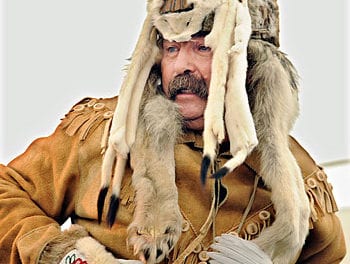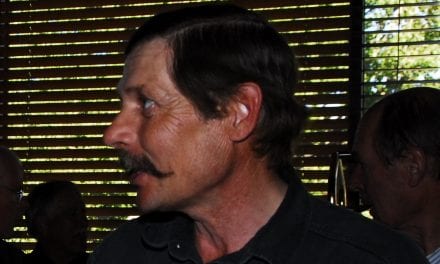(Tape 21 08)
SH: Oh Gerry there were so many funny rescues. Bear ones, we could be all night talking…
SH: Those are good. Can you tell me about any rescue/wildlife/enforcement stories that stick out in your memory? (Tape 21 45)
Gerry: Probably the one that was the most dramatic was the one at Robson but that’s a long story. Somebody else can talk about it. The rescues that stood out for me were when we rescued people, we weren’t just picking up bodies. It just wasn’t a recovery. So the ones that have a little bit of humor attached. One would be Maligne Canyon and it was in the wintertime. Maligne Canyon had a little climb right at the gut of the canyon, and with crampons and ice tools it would take you three hours to do. The crux of the climb was this pitch that was about 80 to 90 feet high and it had a little icy bulge in the middle. It wasn’t extremely demanding but you still had to know where you were going, (where) to put your feet and where you were going to put your ice axe. The canyon of course on both sides had one, a formal trail with a fence, the other side was open. So you got a pretty good view and had a number of bridges that crossed the canyon itself, so you could get a pretty good view of what was going on in certain sections of the canyon. So we got this call that there were two guys in Maligne Canyon and they were stuck on the last pitch. So, this is serious. I asked if they had ropes – “No”. That seemed strange, so we quickly responded out there with a full team. Realized that yup, there’s two people and they’re stuck right in the middle of this place they are climbing solo, and they can’t go up and they can’t go down. So the way to get to them would be that we start from the canyon edge and set up a lowering system and a raising system. We lowered Greg Horne down there and it’s dark at this time and probably in the minus 20s. We set up some lights and set up the systems and lowered Greg Horne down there and he drags a rescue line with him and he clips the line to the first person he encounters, and secures the second person, so nobody is going to fall off and we are all real happy now so up we come with number one. And in about five minutes, sure enough, over the top he comes. He’s dressed different you know. He didn’t have a proper harness, no helmet, didn’t have his ice tools with him, he didn’t have his crampons on. He had these work boots. And I’m thinking okay that seems odd. Maybe the stuff was starting to fall off but maybe Greg Horne must have grabbed all this stuff to control it so there were no falling objects and I’m rationalizing all this. So again down the rope goes, Greg hooks on the next guy, and up he comes five minutes later over the top he comes. The fellow, a French Canadian guy, they are both French Canadian guys, and there’s an issue with language, So they can barely understand English, and they can only say a few words in English, and we can’t understand French, so we are having problems communicating. (Tape 27 08)
So this guy comes over the top and I see that he’s dressed in the same fashion as his climbing partner if I can use the term loosely. And I say to him, I say to him in my best French, “What happened to your crampons?” Because he does not have crampons on but he has his work boots. He looks at me and says “Crampons?” with this quizzical look on his face and all of a sudden it came to me that buddy had no frigging idea what a crampon was, did not own a pair of crampons, nor did anyone that he ever knew have a pair of crampons. I found out later that the ice tools that they had used to pull themselves up to this point, which was fricking amazing in the first place, were these 18” nail pullers. They were carpenters. And they would jab them in like little daggers into the ice as far as they could and essentially pull themselves up with their arms because they had no traction with their feet until they got up to this place that was just impossible for them. Those guys, in my opinion, are the best climbers on the globe ….nobody else could have gotten there, hands down. I don’t care if you are Reinhold Messner, I don’t care if you were Willi Pfisterer, Peter Fuhrmann, nobody, impossible! Tim Auger, not a chance! Couldn’t have got there. These guys, unbelievable! (Tape 29 28)
SH: I like that one a lot. (Note, I recall after this rescue when Gerry was doing the media interviews, one of his infamous quotes about this incident was that “It was not against any regulations to be stupid in a national park”.) This may have been one of the many thing that inspired media training…
SH: How did the Warden Service change over the years? We’ve talked a little bit about that. They have centralization, affirmative action, focus on public safety, changes in 1990s & 2000’s. Do you want to say any more about that?
Gerry: No (Tape 30 30) Laughs.
SH: What about the Warden Service was important to you? – Idea of protecting and preserving national parks, keeping people safe etc.?
Gerry: Yes sure. I mean it was that broad mandate.
SH: Are there any legends or stories associated with the Warden Service that you can share? Is there anyone from the Warden Service that stands out in your mind? (Tape 30 34)
Gerry: Legends …. Well of course there’s Hal Shepherd.
SH: Do you want to tell it in case no one has?
Gerry: No, I don’t think so …. This is off the record, right?
SH: No I don’t think we can do that Gerry. (Laughter)
Gerry: Hums. Oh God Sue. Legends … We’ll come back to this if you want.
SH: Is there anything about the Warden Service, as you knew it, that you would want future generations to know? (Tape 32 30)
Gerry: To know. Yes, the organization drew passionate, committed, funny, serious, a group of individuals that were idiosyncratic. They were individuals in every sense of the word that would in a general sense be prepared to do things as part of a team that were extraordinary in many ways. And that is across the board, so from simply being a good neighbor, to being a good colleague, who would have your back, who would give you the shirt off their back, had time for a beer and if you had a smoke in your pocket, you did that too, a smoke …. to sit down with a coffee and shoot the breeze when time permitted. The glue. That was the glue that essentially made the Warden Service what it was.
SH: What made the Warden Service such a unique organization? (Tape 36 05)
Gerry: The broad spectrum of work demands. You couldn’t be good at just one thing. You had to be operationally functional in everything and, of those, be very good in a number of them. And that’s what made it a good organization, it really did. We had the horse guys, the fire guys, we had the mountain guys, the enforcement, we had the people guys. The ability to work in less than ideal conditions, under stress and perform to a high level. YoYo.
SH: Do you have any lasting memories as a Warden? Favorite park, cabin, horse, trail, humorous stories, etc. (Tape 36 56)
Gerry: All of those. I don’t have single lasting memories Sue, that I cling to – it’s just way too broad. I spent the vast majority of my working life doing very interesting things that were extremely satisfying and fabulous highs so to speak from an emotional perspective. Fabulous friendships that will never ever be forgotten.
SH: We were so lucky. Do you ever miss being a Warden? (Tape 37 54)
Gerry: No, I miss the opportunity that the work provided me to access remote, dramatic places within mountain landscapes. That’s what I miss. I have fond memories of the work, but I don’t miss the work if that makes sense. I’ve had a wonderful career. There were times in the outfit, when we were going through the law enforcement …. changes within the enforcement side of the Warden Service which was very divisive and essentially traumatic, due to the significant role changes that were being proposed and ultimately adopted. But on balance when I look over on my 33 and a half years of work or more in that setting for national parks … and then prior to that, four summers of work for BC Parks, in a wilderness setting. My career has been awesome. I got to travel around Canada, I got to contribute to interesting projects, work with outside organizations, the Alpine Club of Canada, BC Parks, Alberta Parks, business operators, backcountry lodges, the Association of Canadian Mountain Guides, guide licensing standards and a whole variety of interesting tasks. Tremendous times out there that I’ve enjoyed immensely.
SH: Do you have any photos of yourself as a Warden that you would like to donate to the Project, or that we may copy? (Tape 40 45) Yes
Do you have any artifacts/memorabilia that you would like to donate to the Project (Whyte Museum)? Nope
SH: What year did you retire?
Gerry: Early part of 2011
SH: What do you enjoy doing in retirement? (Tape 41 09)
Gerry: Working for Sue building fences. I like to work for Sue. Laughs. Let me see. I continue to ski, still do a little guiding in the winter, active, biking. Keep my wife occupied. I’m a humble stone cutter….
SH Is there anything I haven’t asked you that you think I should know about the Warden Service? Tape 41 58)
Yes, I think the other thing with the Warden Service are the warden families (they) are intrinsically involved in the work that the Wardens did. The concept of leaving your work in the workplace, the idea that you could leave it there and not take it home with you so to speak is deeply flawed. The reason I say that is if you were …. the job was 24 hours. You’d get called at any time. The idea was that you would be able to drop any and everything and proceed to, and contribute to the requirement of the time which was generally an emergency. But Susan, that was basically the drill. And so, families, families were just part of that. That became part of their lifestyle. That was the buy in. The idea that work was, the expectation that you were essentially on call, and I’m not explaining myself well, but you know what I’m getting at, your work was who you were essentially.
SH: No. I just remember as a wife with young kids you were on your own a lot.
Gerry: Ya, ya.
SH: I’m glad you brought that point up. Especially when you lived at the station too, and people would knock at your door … Do you want to talk about that at Cavell (Tape 45 17)
Gerry: Yes, so linking with the concept that families were intrinsic, part of the functional team when it came right down to it. Warden houses, or Warden Stations were a public point of contact and they were advertised essentially as a park office. The only person that actually manned that office was your spouse if she happened to be at home. And the kids that were hanging onto her apron strings or whatever you want to call them. But bottom line is that it was expected that the public would have access, to be able to make contact with whoever was at the station. And of course if it was after normal work hours it was the Park Warden, but if it wasn’t, it was (my wife) Leslie at Cavell. She was there and she would do her best to provide the visitor with the answers to questions they might ask or provide assistance they might need like gas for example, they were running short on gasoline for their vehicle, or some other requirement like fishing licenses for example. They were able to do that or else point them in the right direction, so they could obtain the services that they were looking for. Eyes and ears …. they were another set of eyes and ears, even when they were traveling, often they would run into situations on the road between the station and town that would require them to provide some assistance in some way.
Last Section – August 12, 2019 – 16: 36 00:18
SH: So Gerry and I are now discussing legends, over a beer now
Gerry: Well there’s too many legends out there. Depends what you mean by legend.
SH: Legendary stories.
Gerry: Infamous.
SH: Well I just remember there were so many things that now you couldn’t get away with, because it wouldn’t be politically correct, but boy did we ever laugh some days.
Gerry: Yes… Well let me see, there was Hal Shepherd and his macho approach to Chief Wardening. Laughs.
SH: Do you want to give an example?
Gerry: No, no.
SH: Maybe Portman did already.
Gerry: I’m sure he would have. And then of course there was Willi (Pfisterer) and Peter (Fuhrmann). Those were guys that had a vision, a role, significant impact, and then you know the guys that came in behind them. Clair (Israelson), Tim (Auger).
SH: So Gerry, you must have one really good Willi Pfisterer story. A story other people won’t know. That’s what I’d like you to tell me. You must have a great legend Willi story because he loved you to bits. (Tape 2:22)
Gerry: There you go. Laughs and switches to an Austrian accent. Tape 2: 35
Well, Willi Pfisterer he was the Alpine Specialist in Jasper. And so he’d lead one Jasper school in the wintertime and one Jasper school in the summertime. And the first school he’d go, well at least, one, I can’t say he’d just do one. But the first one he’d do in the wintertime was an eight pass route into the Maligne area, to Poboktan Creek and he insisted on going in January when it was fricking cold. The average mean temperature was -22 or thereabouts. So Willi he enjoyed his comforts. What he didn’t want to do was share his tent with those assholes, so, (Willi says) “Gerry you come and be in my tent with me.” And then we’d pick some other poor sap that knew what he was doing, so we’d have a team of three sleeping in these McKinley tents that had a big center pole. Of course Willi didn’t like things that could break and so he didn’t want a zipper to open the front of the tent. It was this big drawstring, that closed or opened this tunnel like door. This is a bit of a long story but here it goes anyways. (Tape 4:37)
Gerry: So we are on the Eight Pass route, and of course one of my jobs was to make sure the safety equipment that we used on rescues and we used for training, was in good condition and so I got into this routine where every spring and every fall I’d go through absolutely everything. So all the ropes and the climbing helmets and basically the harnesses, every piece of technical equipment. The rescue equipment, the sleeping bags, the tents, the thermorests, all this stuff I go through … everything, and get everything all repaired or replaced. And of course I had a beautiful wife that was very a very talented seamstress and assisted in the repair of whatever. So if gators were ripped or whatever, she’d fix them. If there was a little tear in a tent, well she could sew that up too. So we go on the Eight Pass and it’s cold. And so, part of the routine was when it was time to camp there would be this little, I suppose it was a contest, who could get their tent set up first, who could get the tea boiling and everybody slurping away, before the other guys. It was a sign of competence and efficiency. And so we got into this thing where Willi, being the senior citizen of the group, it was his job to sit and make the kitchen, dig a hole in the snow, get the pots and the stove going, and make the tea. And it was my job, and I think it was Rick Ralf at the time, we stomped out a platform in the snow and then get the tent set up, and it was good form just to layout the sleeping kit for each of the team members. And the deal, what you wanted to do, was get your bed next to a wall. (Tape 7: 27) So I would take one side of the tent and Willi would take the other side of the tent, and then the guy in the middle had to wrap himself around the pole you see. Rick and I are going great guns, we stomp that platform and we put that tent up. We grabbed the packs and pulled out the sleeping bags and the thermorests to open them up, blew them up. I fire Willi’s sleeping bag and thermorest down one side and I fire my sleeping bag and thermorest down the other, and now Rick’s has the middle. Tada! Willi sticks his head in the tent …. He says, “Gerry, you’re on my side.” He’s talking about the side of the tent. I say “No. No Willi, you’re on the other side, there’s your stuff on the other side. Don’t worry about it”.
Willi says “I’m not kidding, that’s my side! Get out of my side!” (Tape 8:22) And he was always joking around so I think he’s just joking back. So I say, “Willi get out of here. Screw off, you’re over there, that’s your side, and this is my side, I’m here.” Willi said “I’m not kidding!” And then he used an obscenity and said, “Get the &^%$ out of there! That’s my side!”
And I realize he’s serious. He’s not just joking. So I go “Alright if you’re going to be that way okay.” And I’m thinking, what a prick, but I’ll switch. But, in the meantime, Rick Ralf has now taken his stuff, he’s taken my stuff and put it in the middle and he’s moved over from the middle over to where Willi was, and Willi comes over to where I was. Jesus. So now I’m in the middle and I’m kind of pissed off. (Tape 9:22) So it’s cold; -20, -25 maybe. And three guys, you know, healthy fellows, breathing hard in there, I don’t know if we were breathing hard, but breathing. And the tent inside, the whole inside of the tent got covered with these needles of frost that were probably an inch in length and formed on the inside of the tent. In the middle of the night I felt this rustling because I’m now in the middle and not on the side wall of the tent. So I feel this rustling beside me and I’m starting to wake up. And I hear this “Shit, Jesus, God dammit.” And then I hear this ZZZZZip like this. And then Willi’s getting out of his sleeping bag. And I realize, aha old man bladder, he’s got old man bladder and he’s gotta get out. (Tape 10:23) So he opens up this drawstring and knocks all this frost onto his bald head, he staggers outside, and he comes back later and he’s cursing. You could hear him cursing out there. He said “God damn it!”… and zip, and goes back to sleep again.
So now it is the next morning and we are out there, he’s a little grumpy, but that’s okay, he’s an old guy and he’s allowed to be grumpy so we have a little bit of breakfast and we had a little cup of coffee, and now it’s time to pack up. So again, it’s a contest in reverse. It’s how efficient, proficient you can be picking up your stuff, loading up and heading out. So the process is reversed; the old fellow is still in the kitchen staring at a pot of boiling tea. And Rick and I are in the inside and what we’re doing is stuffing sleeping bags including his, and his thermorest, and on it goes, and firing this stuff out the tent door. (Tape 11: 39) So I’m in there by myself and Willi decides to come in and have a little visit. And he whispers to me, “Jesus Christ!” he says, “I almost pissed in my sleeping bag!” I said “What?” (Willis says) “I almost pissed in my sleeping bag last night”. I’m not getting it. He says, “You sewed up my hole!” I’m still not getting it. He says, “My hole!” And while he’s talking he’s pulling his jack knife out of his pocket and he’s opening up the blade of the Swiss Army knife. And then I look down towards the floor of the tent and I see that my wife has taken my instructions to heart and she has zigzag sewed this slit in the tent floor at crotch height. If one was to lie on the left side of the tent, looking in and roll over on their belly, the hole would match up. The hole and the end of Willi’s pecker would have been the perfect fit. He takes his knife and he cuts the lovely little sewing job that my wife has spent hours trying to repair. Just so he didn’t have to either piss in his sleeping bag or go outside and relieve himself. Oh ya, that was a legend. Oh ya, and before we left he said, “Listen, don’t tell anybody okay.”
SH: That’s a great story. I think we’re done?
Gerry: Ya we’re done.
SH: Nothing else you want to say?
Gerry: No
End/sh
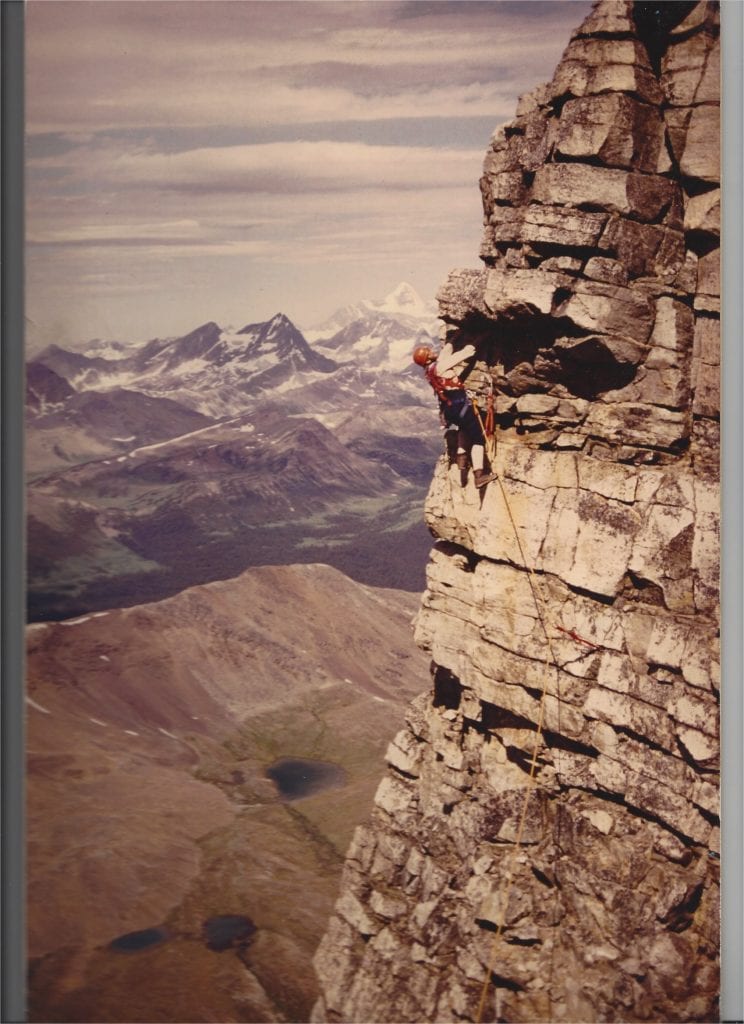
Gerry on Mount Bridgeland
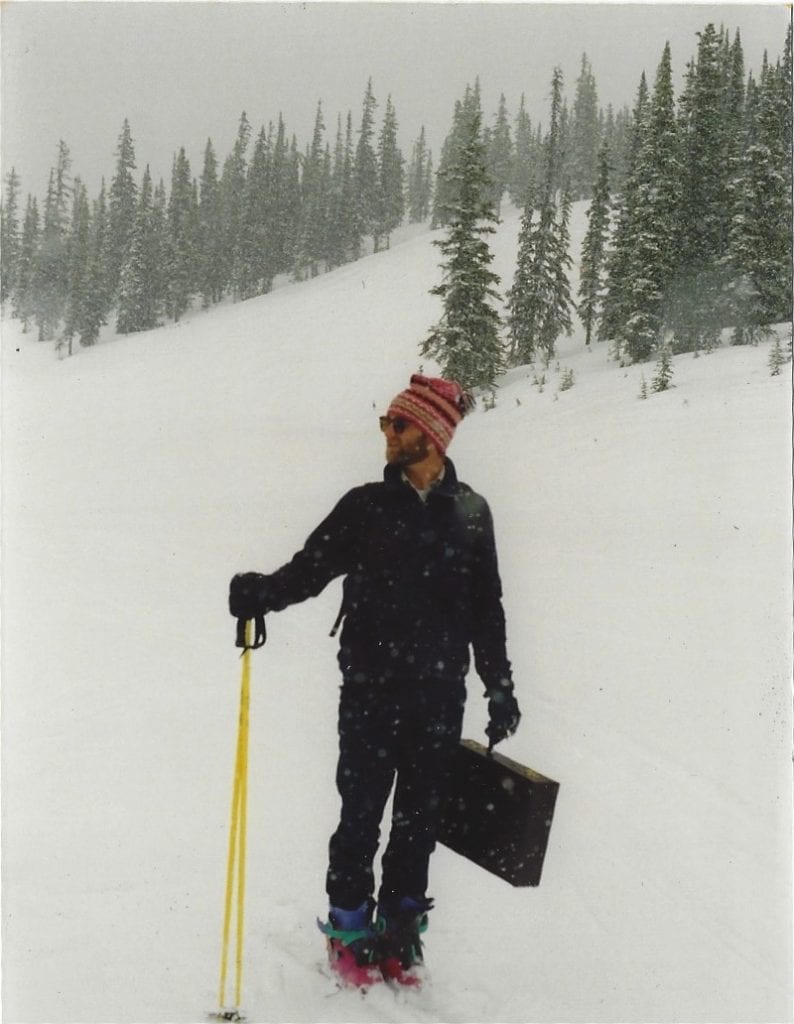
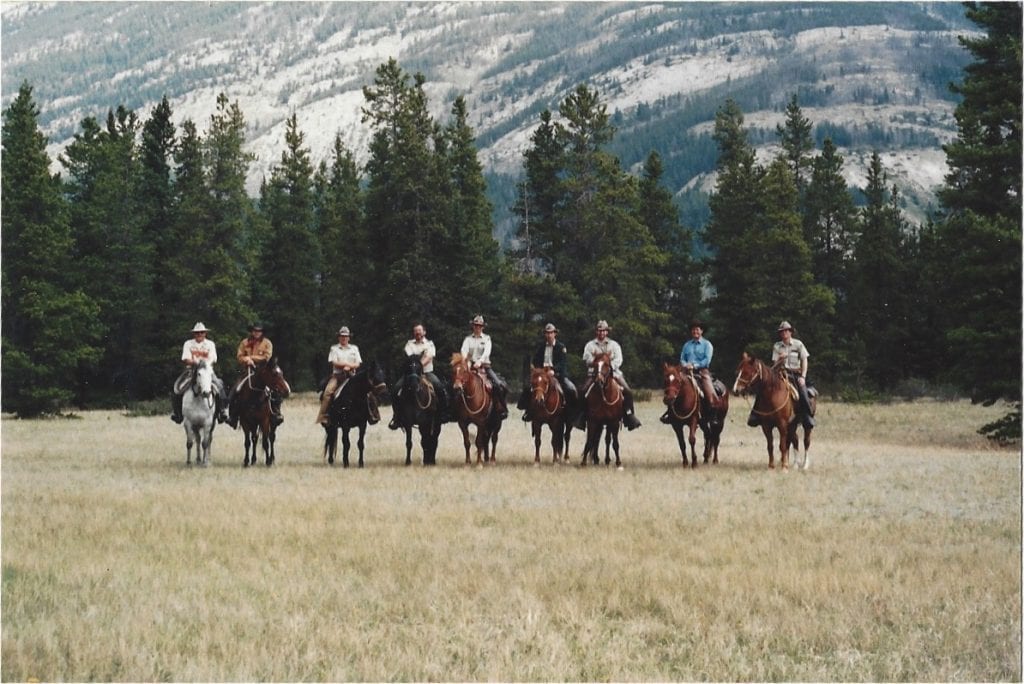
Gerry winter work duties.
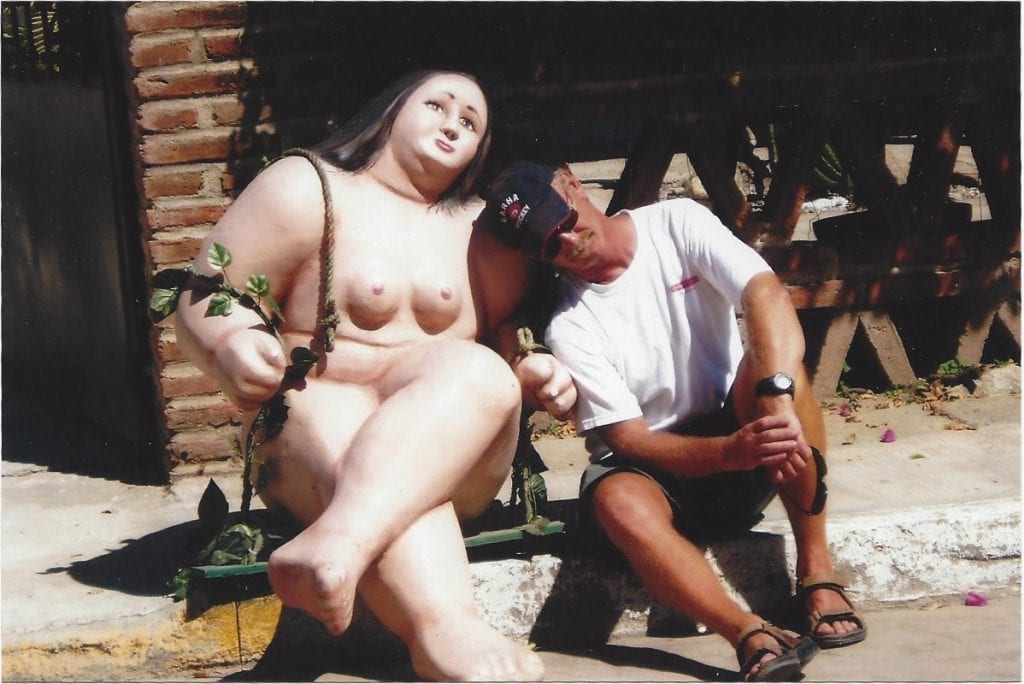
Gerry Israelson in retirement.
This interview was conducted by Susan Hairsine
Susan Hairsine worked for Resource Conservation and Operations in Mt. Revelstoke/Glacier, Jasper and Banff National Parks, as well as for Public Safety in Western and Northern Region for over 30 years. She obtained funding for an oral history of Parks Canada’s avalanche personnel and oversaw the successful completion of the project. Her experience working with several the interviewees during their careers has been an asset to the current project. She was also the Executive Assistant to the Chief Park Wardens of Jasper and Banff National Parks.
